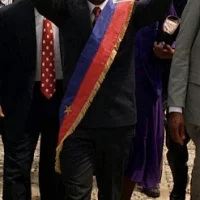In June 1954 the U.S. Central Intelligence Agency, concerned about the threat of communism in Guatemala, assisted in the overthrow of the government led by President Jacobo Arbenz Guzmán. A five-member junta assumed power. Following communications with Guatemala’s Foreign Ministry and consultations with countries in Central America, the U.S. determined that the new Guatemalan government… Read More "Drogas y Derechos Humanos: Changing U.S. Policy towards Guatemala"
Chipping Away at Czechoslovak Communism: The Helsinki Final Act and Charter 77
The Solidarity Movement. Perestroika and Glasnost. The fall of the Berlin Wall. All of these movements, policies, or events had a tremendous influence on the dissolution of communism in Eastern Europe and the end of the Cold War. While not attributed the same attention and certainly less well known, many diplomats operating behind the Iron… Read More "Chipping Away at Czechoslovak Communism: The Helsinki Final Act and Charter 77"
Haiti has long been plagued by coups d’état and regime changes, leading to long-time political instability and weak governance. In this volatile political field, it was easy for a Haitian leader to assume dictatorial powers, as was the case with President François Duvalier, also known as “Papa Doc.” After becoming the President of Haiti in… Read More "The Overthrow of Haiti’s Aristide"
Establishing an Escape Network in Post-War Hungary
Throughout most of World War II, Hungary operated in conjunction with the Axis Powers and actively contributed to the Nazi war effort under the leadership of Miklós Horthy. While invading Soviet troops had pushed out the occupying German forces by April 1945, the newly established Russian presence quickly posed a precarious threat to Hungarian stability… Read More "Establishing an Escape Network in Post-War Hungary"
The Siberian Seven: Escaping Religious Persecution in the U.S.S.R.
From its inception, the Soviet Union became the first state in the world to actively attempt to eliminate religion from society. Religion was viewed by Soviet leadership as counter-intuitive to scientific reason and as a threat to the consolidation and exertion of state power. Correspondingly, under Soviet religious policy, tens of thousands of houses of worship… Read More "The Siberian Seven: Escaping Religious Persecution in the U.S.S.R."
“How many people can you fit on a 747?”- Operations Sheba and Solomon
The Ethiopian Aliyah, as it is known in Israel, was the migration during the 1980’s of thousands of Ethiopian Jews [known in Amharic as Falashas; some consider the term pejorative] to Israel. The Israeli Defense Force (IDF) played a major role in the evacuation of the Ethiopian Jews as they came under increasing threat from… Read More "“How many people can you fit on a 747?”- Operations Sheba and Solomon"
Kimberley Process: Commercial Diplomacy to Stem the Flow of Blood Diamonds
During the 1990s, several African countries, namely Angola, Cote d’Ivoire, the Democratic Republic of the Congo, Sierra Leone, and Liberia were plunged into chaos and embroiled in devastating civil wars. Thanks to economic and political insecurity and contentious inter-ethnic relations, rebel groups such as the Patriotic National Front of Liberia under the leadership of Guy… Read More "Kimberley Process: Commercial Diplomacy to Stem the Flow of Blood Diamonds"
Anatomy of an Overthrow: How an African Leader was Toppled
A council of combined security forces known as the Derg staged a coup d’état on September 12, 1974 against Ethiopian Emperor Haile Selassie I, arresting and imprisoning the monarch who had ruled for decades. The committee renamed itself the Provisional Military Administrative Council, took control of the government, soon abolished the monarchy and established Marxism-Leninism… Read More "Anatomy of an Overthrow: How an African Leader was Toppled"
“The Cold War Was Truly Over” — The 1986 Reykjavik Summit
After the 1985 Geneva Summit, where President Ronald Reagan and leader of the Soviet Union, Mikhail Gorbachev, met for the first time, the Reykjavik Summit, held on October 11-12, 1986, presented an opportunity to try to reach an agreement between the two sides on arms control. While Gorbachev wanted to ban all ballistic missiles and limit the talks… Read More "“The Cold War Was Truly Over” — The 1986 Reykjavik Summit"
Kleptocracy and Anti-Communism: When Mobutu Ruled Zaire
Born to a modest family, Joseph-Desiré Mobutu prospered in the Force Publique, the army of the Belgian Congo. Mobutu became army chief of staff following a coup against Patrice Lumumba, and after a second coup on November 25, 1965 assumed power as military dictator and president. He changed the Congo’s name to the Republic of… Read More "Kleptocracy and Anti-Communism: When Mobutu Ruled Zaire"

